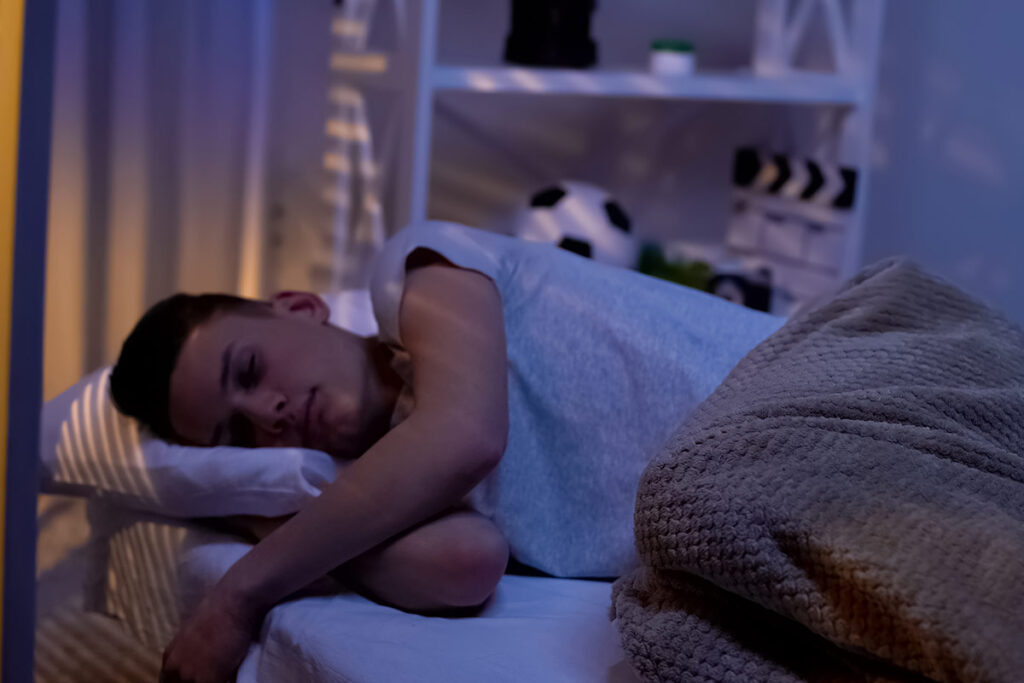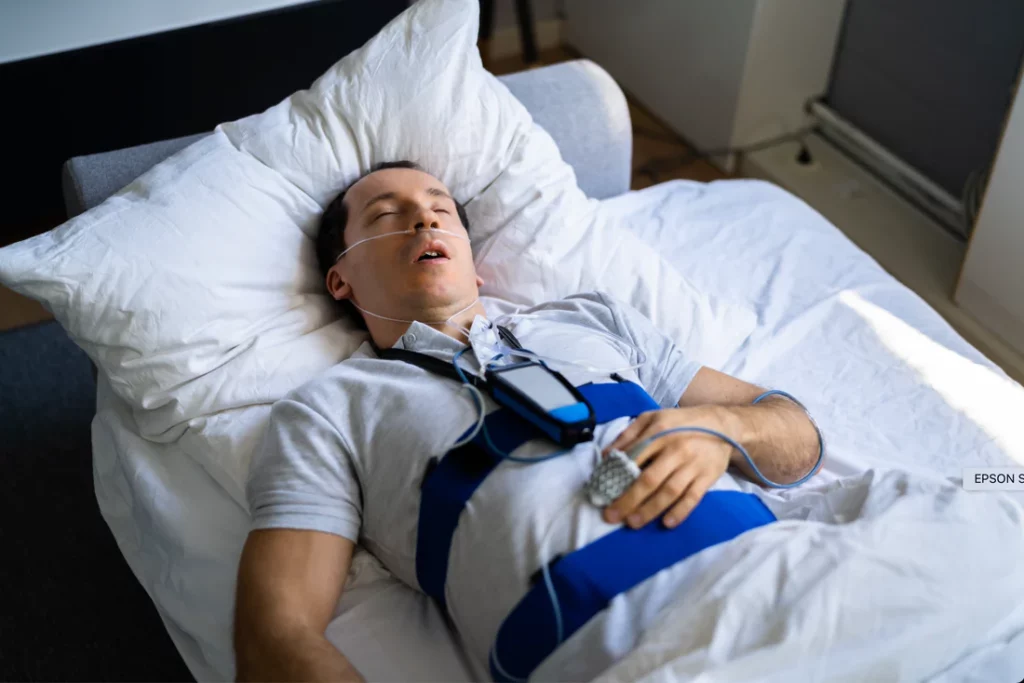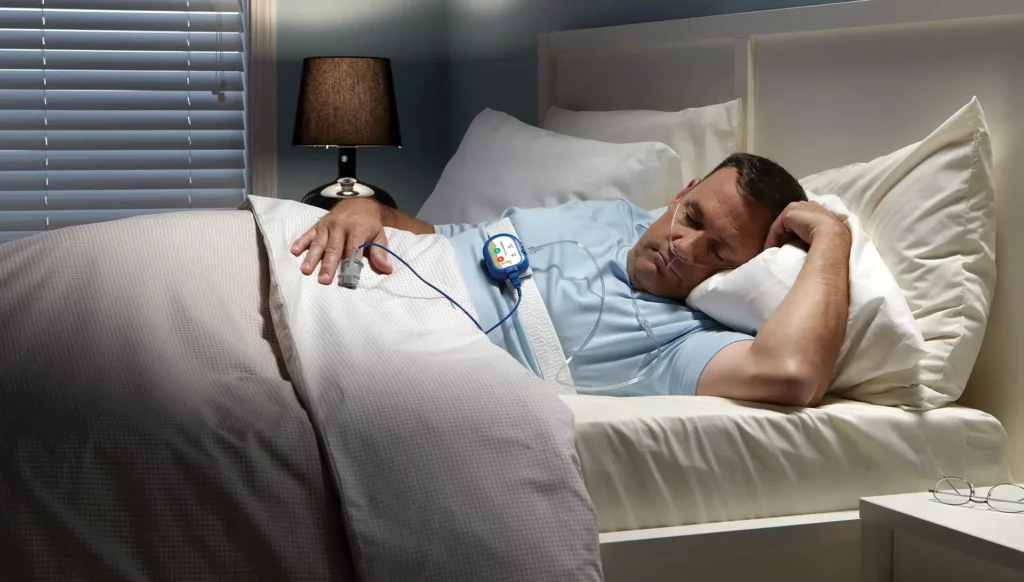What Is a Sleep Study and Why Might Someone Need One?
A sleep study, medically known as polysomnography, is a comprehensive diagnostic test that monitors and records your body’s activity during sleep to identify sleep disorders. The test tracks brain waves, oxygen levels, heart rate, breathing patterns, eye movements, and leg movements throughout the night.
The process involves wearing sensors and monitoring devices that capture detailed data about your sleep cycles and any disruptions. In Launceston, most patients undergo home-based sleep studies using portable diagnostic recorders in their own beds, making the experience more comfortable and convenient than traditional laboratory settings.
What Does the Test Measure?
Sleep studies collect multiple data points simultaneously to build a complete picture of your sleep health:
- Respiratory function: Monitors breathing patterns, airflow, and oxygen saturation levels
- Cardiac activity: Tracks heart rate and rhythm throughout different sleep stages
- Brain activity: Records electrical signals to identify sleep stages and disruptions
- Physical movements: Detects leg movements, body position changes, and muscle activity
- Sleep architecture: Maps the progression through light sleep, deep sleep, and REM cycles
Which Conditions Can Sleep Studies Diagnose?
Obstructive sleep apnoea (OSA) stands as the most commonly diagnosed condition through sleep studies, affecting thousands of Australians. This serious disorder causes repeated breathing interruptions during sleep when throat muscles relax and block the airway.
Sleep studies also identify:
- Central sleep apnoea: Brain fails to send proper signals to breathing muscles
- Periodic limb movement disorder: Repetitive leg movements disrupting sleep quality
- Narcolepsy: Excessive daytime sleepiness and sudden sleep attacks
- Insomnia: Chronic difficulty falling or staying asleep
- Restless legs syndrome: Uncomfortable sensations causing urge to move legs
- REM sleep behaviour disorder: Acting out dreams during REM sleep
Why Early Detection Matters for Your Health
Untreated sleep disorders create cascading health problems that extend far beyond feeling tired. Identifying and treating these conditions early prevents serious complications and dramatically improves quality of life.
Sleep apnoea, when left undiagnosed, increases risks for:
- Cardiovascular issues such as high blood pressure, heart disease, or stroke
- Metabolic disorders including obesity or type 2 diabetes
- Mental health conditions like depression or anxiety
- Impaired cognitive function leading to memory problems or difficulty concentrating
Who Provides Sleep Studies in Launceston?
Sleep study providers Launceston include several established services that specialise in diagnosing sleep disorders. The two primary providers are Sleep Solutions Australia and Health Dynamics Tasmania, both offering comprehensive diagnostic services to residents across the region.
Main Local Providers
Sleep Solutions Australia operates throughout Tasmania, providing accessible sleep diagnostic services with a focus on streamlining the referral-to-diagnosis pathway. Health Dynamics Tasmania similarly offers sleep study services as part of their broader healthcare offerings, ensuring patients have multiple options when seeking assessment for potential sleep disorders.
Both providers work closely with local medical professionals to ensure patients receive appropriate diagnostic testing. The availability of multiple providers means shorter waiting times and greater flexibility in scheduling studies according to patient preferences.
Service Types Available
Patients in Launceston can access two distinct types of sleep studies:
- Home-based sleep studies: Portable diagnostic recorders are delivered to patients who conduct the study in their own bedroom, offering comfort and convenience
- Clinic-based studies: Conducted in specialised sleep laboratories with more comprehensive monitoring equipment for complex cases
Home-based studies have become increasingly popular due to their convenience and ability to capture sleep patterns in the patient’s natural environment. These studies use sophisticated portable devices that monitor breathing, oxygen levels, heart rate, and body position throughout the night.
Clinic-based studies remain available for patients requiring more detailed assessment or those with complex medical conditions that necessitate supervised monitoring. Such detailed assessments are often achieved through polysomnography, a type of sleep study that provides extensive information about a person’s sleep patterns.
The Referral Process
All sleep study providers in Launceston require a referral from a GP or specialist before booking a study. This referral system ensures patients receive appropriate screening and that the study is medically necessary. Your GP will assess your symptoms, complete initial questionnaires, and determine whether a sleep study is the appropriate next step in your care pathway.
How Does One Qualify for a Sleep Study in Launceston?
Do I need a referral to get a sleep study in Launceston? Yes, all sleep studies in Launceston require a referral from either your general practitioner or a medical specialist. This referral serves as the gateway to accessing diagnostic services and ensures Medicare coverage for eligible patients.
Your GP acts as the first point of contact when sleep concerns arise. During your appointment, they’ll assess your symptoms—such as loud snoring, daytime fatigue, or witnessed breathing pauses during sleep—and determine whether a sleep study is medically necessary. Specialists including respiratory physicians, ear nose and throat surgeons, or cardiologists can also provide referrals when sleep disorders intersect with their area of expertise.
What screening tools determine eligibility for a sleep study? Two validated questionnaires form the foundation of the eligibility criteria Medicare Tasmania requires: the STOP BANG questionnaire and the Epworth Sleepiness Scale (ESS).
The STOP BANG questionnaire evaluates eight risk factors for obstructive sleep apnoea:
- Snoring loudly
- Tiredness during the day
- Observed apnoeas (breathing pauses)
- High blood Pressure
- Body Mass Index over 35
- Age over 50
- Neck circumference greater than 40cm
- Male Gender
A score of three or higher indicates moderate to high risk and typically supports eligibility for a sleep study.
The Epworth Sleepiness Scale measures daytime sleepiness by asking patients to rate their likelihood of dozing off in eight everyday situations. Scores range from 0 to 24, with results above 10 suggesting excessive daytime sleepiness that warrants investigation.
Can I skip the questionnaires? These screening tools are mandatory for Medicare-subsidised sleep studies in Tasmania. They provide objective data that helps determine medical necessity without requiring an initial consultation with a sleep physician, streamlining the referral requirements sleep study process and reducing upfront costs for patients.

What Are the Typical Costs Associated with Sleep Studies in Launceston?
The cost of sleep study Launceston services varies depending on whether you choose home-based or clinic-based testing, though Medicare coverage Tasmania significantly reduces out-of-pocket expenses for eligible patients. Most individuals with proper referrals and qualifying questionnaire scores pay little to nothing for the diagnostic component of their sleep study.
Home-Based Sleep Study Costs
Home-based sleep studies represent the most common and cost-effective option in Launceston. These studies typically range from $300 to $600 when paid privately. The portable diagnostic equipment is delivered to your home, you complete the study in your own bed, and return the device the following day. For patients meeting Medicare eligibility criteria, the bulk of these costs are covered through Medicare rebates, leaving minimal out-of-pocket expenses.
Clinic-Based Sleep Study Costs
In-laboratory sleep studies conducted at dedicated sleep clinics cost substantially more, often between $1,500 and $2,500 for private patients. These comprehensive studies involve overnight monitoring by trained technologists in a clinical setting. Medicare provides coverage for eligible patients, though some facilities may charge gap fees for accommodation or additional monitoring services not covered under standard rebates.
Medicare Coverage Breakdown
Medicare subsidises the following components for eligible patients:
- Diagnostic recording: The actual sleep monitoring equipment and data collection
- Scoring and analysis: Professional interpretation by registered polysomnographic technologists
- Physician review: Assessment and report preparation by qualified sleep physicians
The Medicare rebate covers approximately 85% of the scheduled fee for bulk-billed services. Patients with valid referrals and completed STOP BANG and Epworth Sleepiness Scale questionnaires typically receive full coverage without upfront payment at participating providers. Some services may charge small administrative fees or equipment deposits, which are refunded upon device return.
What Does Medicare Cover Regarding Sleep Studies in Tasmania?
Does Medicare pay for sleep studies in Tasmania? Yes, Medicare subsidizes most costs associated with sleep studies in Tasmania for patients who meet specific eligibility criteria, making diagnostic testing accessible without significant out-of-pocket expenses.
Medicare’s role centres on reducing financial barriers to diagnosing sleep disorders. The government recognizes sleep apnea and related conditions as serious health concerns requiring proper investigation. Through Medicare rebates, eligible patients receive coverage for:
- The portable diagnostic equipment used during home-based studies
- Professional scoring and interpretation of sleep data by registered polysomnographic technologists
- Review and reporting by qualified sleep physicians
- Follow-up consultations to discuss results and treatment options
What requirements must patients meet for Medicare coverage? Three essential criteria determine eligibility for Medicare rebates on sleep studies:
- Valid medical referral: A GP or specialist must provide a written referral specifically requesting a sleep study
- STOP BANG questionnaire completion: This screening tool assesses risk factors including snoring, tiredness, observed breathing pauses, blood pressure, body mass index, age, neck circumference, and gender
- Epworth Sleepiness Scale (ESS) assessment: Patients complete this questionnaire measuring daytime sleepiness across various situations
The questionnaire scores help determine whether a patient qualifies for a subsidized study without requiring an initial consultation with a sleep physician. This streamlined approach saves both time and money whilst ensuring appropriate candidates receive testing.
Patients who don’t meet the questionnaire thresholds may still access sleep studies but could face higher costs or need additional specialist consultations. The system prioritises those with higher clinical suspicion of sleep disorders, ensuring Medicare resources target individuals most likely to benefit from intervention.
How Are Sleep Study Results Processed and What Happens Next?
Who analyses your sleep study data and how long does it take? Registered polysomnographic technologists score your sleep study results, typically within 5-7 business days of completing your test. These specialists analyse hours of recorded data, examining breathing patterns, oxygen levels, heart rate, and sleep stages to identify potential disorders.
The scoring process involves meticulous review of your entire night’s data. Technologists identify and count respiratory events, measure oxygen desaturation episodes, and assess sleep architecture. They document specific metrics including the Apnoea-Hypopnoea Index (AHI), which counts breathing interruptions per hour of sleep.
What happens after the initial scoring? A qualified sleep physician reviews the technologist’s findings alongside your medical history and questionnaire responses. This dual-layer review ensures accuracy in diagnosis reporting sleep disorders. The physician interprets the data within the context of your symptoms, determining whether you have obstructive sleep apnea or another sleep-related condition.
The sleep physician review process includes:
- Assessment of AHI severity (mild, moderate, or severe)
- Evaluation of oxygen saturation patterns
- Consideration of sleep efficiency and architecture
- Correlation with reported symptoms and risk factors
- Determination of appropriate treatment recommendations
How do you receive your results? Your GP receives a comprehensive report detailing the findings and recommended treatment options. This report includes technical data, diagnostic conclusions, and specific management suggestions. Your doctor schedules a follow-up appointment to discuss results and next steps, which may include CPAP therapy, lifestyle modifications, or referral to additional specialists.
The entire process from study completion to receiving results through your GP typically takes 10-14 days, though urgent cases may be expedited. This timeframe allows for thorough analysis whilst ensuring timely access to treatment for diagnosed sleep disorders.
See Also : Sleep Testing in Devonport: What Equipment Is Used During Home Studies?
Are There Additional Services or Follow-Up Options Available After a Sleep Study in Launceston?
Yes, Launceston providers offer comprehensive follow-up care including telehealth consultations Tasmania services, making ongoing management convenient for patients across the region. Most sleep study providers in the area have adapted to offer remote consultations, eliminating the need for repeated clinic visits.
Telehealth Consultation Options
Follow-up care sleep disorders has become increasingly accessible through virtual appointments. Patients can discuss their results, treatment options, and progress with sleep physicians from home. This approach proves particularly valuable for:
- Initial treatment planning after diagnosis
- CPAP therapy adjustments and troubleshooting
- Monitoring treatment effectiveness
- Addressing concerns without travel requirements
These telehealth consultations Tasmania services typically attract Medicare rebates when provided by qualified sleep physicians, reducing out-of-pocket expenses for eligible patients.

Ongoing Support and Monitoring
Continuous support forms a critical component of successful sleep disorder management. Providers in Launceston recognize that diagnosis represents just the beginning of the treatment journey. Ongoing support CPAP therapy includes:
- Regular equipment checks and mask fitting adjustments
- Technical support for device troubleshooting
- Therapy compliance monitoring through device data
- Access to respiratory therapists and sleep technicians
- Educational resources about sleep hygiene
Many providers offer direct contact channels for patients experiencing difficulties with their treatment, ensuring issues get resolved promptly rather than leading to therapy abandonment.
Long-Term Management Approach
Sleep disorders often require sustained management rather than one-off treatment. Providers typically schedule follow-up appointments at three months, six months, and annually to assess therapy effectiveness. These reviews may involve:
- Download and analysis of CPAP machine data
- Reassessment using sleep questionnaires
- Equipment replacement or upgrades as needed
- Adjustments to pressure settings based on usage patterns
Ready to address your sleep concerns? Contact a Launceston sleep study provider with your GP referral to begin the assessment process and access comprehensive ongoing care that fits your lifestyle.
FAQs About Sleep Studies in Launceston
A sleep study, or polysomnography, is a diagnostic test that monitors brain activity, breathing, heart rate, oxygen levels, and body movements during sleep to detect sleep disorders.
2. Who should consider a sleep study?
Individuals experiencing loud snoring, daytime fatigue, breathing pauses during sleep, or other suspected sleep disorders may benefit from a sleep study.
3. What conditions can sleep studies detect?
Sleep studies can diagnose obstructive and central sleep apnoea, narcolepsy, insomnia, restless legs syndrome, REM sleep behaviour disorder, and periodic limb movement disorder.
4. How are sleep studies conducted in Launceston?
Patients can undergo home-based studies using portable devices or clinic-based studies in specialised sleep labs, depending on the complexity of their condition.
5. Do I need a referral for a sleep study?
Yes, a referral from a GP or specialist is required to access a sleep study in Launceston, which also helps determine Medicare eligibility.
6. What screening tools determine eligibility for Medicare-covered studies?
The STOP BANG questionnaire and the Epworth Sleepiness Scale (ESS) assess risk factors for sleep disorders and excessive daytime sleepiness to qualify for Medicare rebates.
7. How much does a sleep study cost in Launceston?
Home-based studies typically cost $300–$600 privately, while clinic-based studies range from $1,500–$2,500. Eligible patients may receive significant Medicare rebates.
8. How long does it take to get sleep study results?
Technologists score the study in 5–7 business days, followed by a sleep physician review. Results are usually shared with your GP within 10–14 days.
9. What follow-up care is available after a sleep study?
Providers offer telehealth consultations, CPAP therapy monitoring, equipment support, and regular reviews to ensure effective long-term management of sleep disorders.

